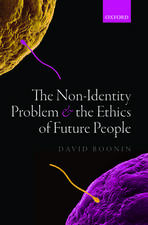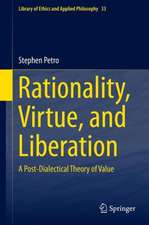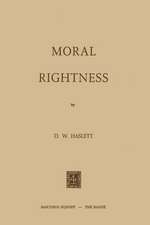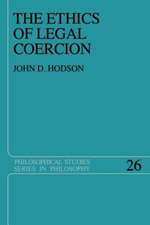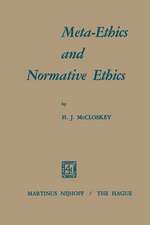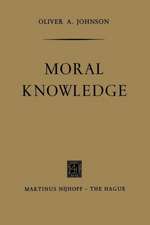The Radical Choice and Moral Theory: Through Communicative Argumentation to Phenomenological Subjectivity: Analecta Husserliana, cartea 45
Autor Zhenming Zhaien Limba Engleză Hardback – 31 oct 1994
With exceptional acumen and mastery of the philosophical argument, the author -- a young native Chinese lately trained in a Western university -- delineates a fascinating route along which the philosophical question of justification raised in the analytic tradition can be answered on the basis of phenomenology.
A noteworthy contribution to the interplay between the Anglo--American and Continental schools of philosophy.
| Toate formatele și edițiile | Preț | Express |
|---|---|---|
| Paperback (1) | 552.44 lei 38-44 zile | |
| SPRINGER NETHERLANDS – 18 feb 2012 | 552.44 lei 38-44 zile | |
| Hardback (1) | 642.51 lei 6-8 săpt. | |
| SPRINGER NETHERLANDS – 31 oct 1994 | 642.51 lei 6-8 săpt. |
Din seria Analecta Husserliana
- 17%
 Preț: 524.10 lei
Preț: 524.10 lei - 24%
 Preț: 814.98 lei
Preț: 814.98 lei - 20%
 Preț: 570.72 lei
Preț: 570.72 lei - 15%
 Preț: 643.00 lei
Preț: 643.00 lei - 18%
 Preț: 2098.96 lei
Preț: 2098.96 lei - 15%
 Preț: 636.12 lei
Preț: 636.12 lei - 15%
 Preț: 643.84 lei
Preț: 643.84 lei - 18%
 Preț: 952.57 lei
Preț: 952.57 lei - 18%
 Preț: 1222.01 lei
Preț: 1222.01 lei - 18%
 Preț: 950.52 lei
Preț: 950.52 lei - 15%
 Preț: 642.18 lei
Preț: 642.18 lei - 24%
 Preț: 1072.12 lei
Preț: 1072.12 lei - 18%
 Preț: 947.67 lei
Preț: 947.67 lei - 18%
 Preț: 1225.94 lei
Preț: 1225.94 lei - 24%
 Preț: 1075.48 lei
Preț: 1075.48 lei - 18%
 Preț: 949.73 lei
Preț: 949.73 lei - 15%
 Preț: 647.59 lei
Preț: 647.59 lei - 20%
 Preț: 577.73 lei
Preț: 577.73 lei -
 Preț: 386.22 lei
Preț: 386.22 lei - 15%
 Preț: 651.19 lei
Preț: 651.19 lei - 18%
 Preț: 960.42 lei
Preț: 960.42 lei -
 Preț: 390.08 lei
Preț: 390.08 lei - 18%
 Preț: 1128.89 lei
Preț: 1128.89 lei
Preț: 642.51 lei
Preț vechi: 755.88 lei
-15% Nou
Puncte Express: 964
Preț estimativ în valută:
122.96€ • 127.64$ • 102.53£
122.96€ • 127.64$ • 102.53£
Carte tipărită la comandă
Livrare economică 22 martie-05 aprilie
Preluare comenzi: 021 569.72.76
Specificații
ISBN-13: 9780792328919
ISBN-10: 0792328914
Pagini: 194
Ilustrații: XI, 194 p.
Dimensiuni: 152 x 229 x 13 mm
Greutate: 0.48 kg
Ediția:1994
Editura: SPRINGER NETHERLANDS
Colecția Springer
Seria Analecta Husserliana
Locul publicării:Dordrecht, Netherlands
ISBN-10: 0792328914
Pagini: 194
Ilustrații: XI, 194 p.
Dimensiuni: 152 x 229 x 13 mm
Greutate: 0.48 kg
Ediția:1994
Editura: SPRINGER NETHERLANDS
Colecția Springer
Seria Analecta Husserliana
Locul publicării:Dordrecht, Netherlands
Public țintă
ResearchCuprins
1. Introduction: The Issue and the Background.- § 1. The Is-Ought Controversy.- § 2. The Continental Tradition.- § 3. Communicative Rationality and My Aim in this Program.- 2. Communicative Rationality and the Justification of Normative Validity Claims.- § 1. Communicative Rationality: the Counter-Factual.- § 2. Communicative vs. Cognitive Rationality.- § 3. Initial Principles.- § 4. Human Reason as the Only Justificatory Power of Values.- § 5. Normative Validity Claims and Cultural Relativism.- 3. The Necessity of Radical Choice.- § 1. Habermas’ Communicative Ethics.- § 2. Alan Gewirth’s Attempt.- § 3. The Question of Death.- § 4. Good life No More And No Less Than the Life of Humans.- § 5. The Rationality of Radical Choice.- § 6. Humanitude vs. Human Nature.- 4. Meaning, Ideality and Subjectivity.- § 1. Recapitulation and Strategy 91 § 2. The Naturalistic Notion of “ Subjectivity” and Reason vs. Cause.- § 3. The Thesis of Subjectivity.- § 4. Ideality and Validity Claims.- § 5. Subjectivity and the Lifeworld Experience.- § 6. The Transcendence of Subjectivity.- § 7. Constitutive as Opposed to Conative Subjectivity.- 5. Radical Choice Fulfilled and the First “ Ought”.- § 1. Subjectivity and Humanitude.- § 2. Radical Choice fulfilled and the Normative Redeemed.- § 3. Freedom and the Normative.- § 4. “ Ought” and Responsibility.- § 5. ?Value), ?Disvalue? and ?Non-Value?.- § 6. Pre-Moralic and Moralic; ?Moral?, ?Immoral? and ?Amoral?.- § 7. Semi-Final Remarks and Anticipations.







